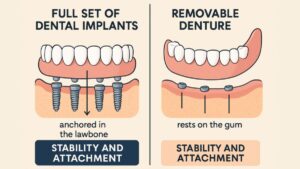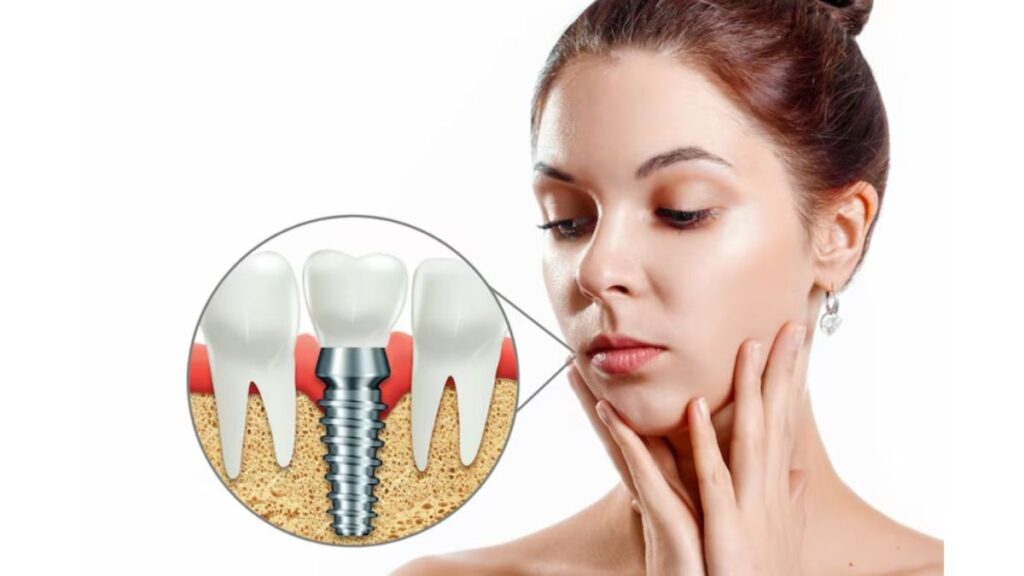Key Takeaways
- Full mouth dental implants provide a permanent solution for extensive tooth loss.
- Not all individuals are ideal candidates; factors like bone density and overall health play a role.
- Alternative treatments are available for those who may not qualify.
Introduction
Modern advances in dental restoration have made full-mouth dental implants one of the most sought-after solutions for those with extensive or complete tooth loss. These innovative restorations offer a life-changing improvement in functionality and aesthetics, helping patients regain confidence and oral health. However, the decision to proceed with full arch dental implants is nuanced, requiring careful consideration of individual dental and medical circumstances to ensure long-term success.
Full arch dental implants are designed to mimic natural teeth in look and feel, rebuilding a patient’s bite and smile. This solution fosters stability and durability that traditional dentures often lack by anchoring multiple prosthetic teeth to titanium posts implanted in the jawbone. However, achieving optimal results means understanding who makes an ideal candidate and assessing potential risks and alternatives.
Not everyone is suited for full-mouth dental implants. Factors like bone quality, overall health conditions, and oral hygiene status significantly impact the prognosis and outcomes of such advanced interventions. Before committing, patients must educate themselves on what the procedure involves and whether alternative treatments might better fit their unique case.
This in-depth guide explores what makes a candidate suitable for full mouth dental implants, examines potential risks and complications, and outlines other dental restoration options for those who may not qualify.
Understanding Full-Mouth Dental Implants
Full mouth dental implants consist of a comprehensive restoration technique where multiple titanium posts are surgically placed into the jawbone to support a complete arch of prosthetic teeth. This procedure not only replicates the natural appearance of teeth but also restores oral functionality, allowing patients to eat, speak, and smile with new confidence. Compared to older restorative techniques, implants provide superior comfort and permanence, thanks to their direct integration with the jawbone through osseointegration. Typically, the prosthetic teeth are fabricated from high-quality, durable materials to match the look of natural enamel.
Implants are especially beneficial for patients seeking a stable, long-term solution after losing most or all of their teeth due to trauma, decay, or periodontal disease. Because implants do not rely on neighboring teeth for support, they help preserve remaining structures and prevent further bone loss, which is often associated with traditional dentures.

Who Is an Ideal Candidate?
The success of full-mouth dental implants heavily depends on selecting the right candidates. Here are the primary considerations dental professionals use to evaluate suitability:
- Bone Density:Sufficient jawbone is vital to secure the implants. If significant bone loss has occurred, bone grafting procedures may be recommended to rebuild the foundation required for implantation.
- Overall Health:Chronic conditions such as uncontrolled diabetes, autoimmune disorders, or cardiovascular disease can interfere with healing and increase surgical risk. Candidates must be in overall good health and able to undergo oral surgery safely.
- Oral Health:Healthy gum tissue prevents infections and ensures long-term implant stability. Those with advanced periodontal disease must address gum health before proceeding.
- Lifestyle Factors:Smoking adversely affects healing and increases the risk of implant failure. Dental professionals may recommend quitting smoking before and after surgery to improve outcomes.
Potential Risks and Complications
While full-mouth dental implants are highly predictable, specific risks and complications must be considered. Surgical side effects could include infection at the implant site, nerve injury, or rare sinus complications (for upper jaw implants). The long-term success of implants hinges on proper bone integration and ongoing oral hygiene. Poor habits can lead to peri-implantitis, an inflammatory condition that threatens the bone and implant.
- Surgical Risks:Infection, bleeding, nerve damage, or sinus issues may occur during or after surgery.
- Implant Failure:Failure to integrate with bone, often due to underlying health problems or inadequate post-surgical care, may require removal and additional procedures.
- Maintenance Needs:Consistent dental visits and diligent, daily oral care are essential for preventing complications and preserving implant longevity.
Alternative Solutions
Other restorative options are available for patients who do not qualify for full-mouth dental implants, whether due to health, insufficient bone, or financial considerations. Traditional dentures remain the most widely used alternative, offering removable prosthetics that restore appearance and basic chewing function. While more affordable upfront, dentures can shift or cause discomfort due to a lack of stabilization.
- Traditional Dentures:Easily removable, lower in cost, but sometimes less stable and comfortable than implants.
- Dental Bridges:A fixed solution that uses neighboring natural teeth for support, suitable for those with some healthy teeth.
- Partial Implants:Targeted placement to replace several, but not all, missing teeth, providing improved stability without a complete arch restoration.
These alternatives offer unique benefits and limitations so that a dental professional can provide guidance tailored to the individual’s needs and expectations.
Consulting with a Dental Professional
The journey toward improved oral health and function begins with a thorough evaluation by a skilled dental specialist. Through advanced diagnostic imaging and a comprehensive medical history review, your dental team can determine candidacy, discuss potential procedures, and recommend an individualized treatment plan.
Open communication about personal goals, concerns, and lifestyle expectations ensures the success of the restoration and the patient’s long-term satisfaction and well-being.
Conclusion
Full-mouth dental implants provide a life-changing and permanent option for individuals with extensive tooth loss, restoring function and appearance. However, this treatment is highly individualized and not suitable for everyone. Bone density, overall health, and commitment to proper oral hygiene are critical in determining candidacy. Evaluating alternative solutions, such as dentures or implant-supported bridges, is equally essential to ensure the best fit for each patient’s unique needs. By consulting with an experienced dental professional, patients can receive a thorough assessment and personalized guidance, leading to informed decisions that promote long-term oral health, functionality, and renewed self-confidence.







